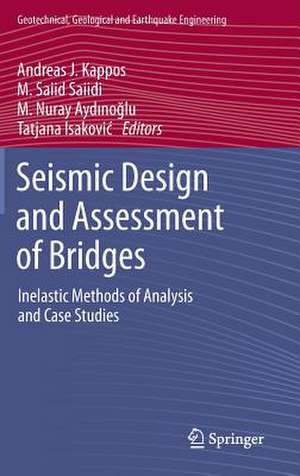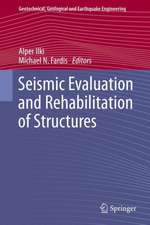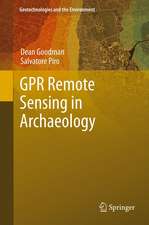Seismic Design and Assessment of Bridges: Inelastic Methods of Analysis and Case Studies: Geotechnical, Geological and Earthquake Engineering, cartea 21
Editat de Andreas J. Kappos, M. Saiid Saiidi, M. Nuray Aydınoğlu, Tatjana Isakovićen Limba Engleză Hardback – 18 apr 2012
Hence the key objective of this book is two-fold, first to present all important methods belonging to the aforementioned category in a uniform and sufficient for their understanding and implementation length, and to provide also a critical perspective on them by including selected case-studies wherein more than one methods are applied to a specific bridge and by offering some critical comments on the limitations of the individual methods and on their relative efficiency.
The book should be a valuable tool for both researchers and practicing engineers dealing with seismic design and assessment of bridges, by both making the methods and the analytical tools available for their implementation, and by assisting them to select the method that best suits the individual bridge projects that each engineer and/or researcher faces.
| Toate formatele și edițiile | Preț | Express |
|---|---|---|
| Paperback (1) | 637.46 lei 6-8 săpt. | |
| SPRINGER NETHERLANDS – 9 mai 2014 | 637.46 lei 6-8 săpt. | |
| Hardback (1) | 642.36 lei 6-8 săpt. | |
| SPRINGER NETHERLANDS – 18 apr 2012 | 642.36 lei 6-8 săpt. |
Din seria Geotechnical, Geological and Earthquake Engineering
- 15%
 Preț: 665.73 lei
Preț: 665.73 lei - 18%
 Preț: 1405.90 lei
Preț: 1405.90 lei - 15%
 Preț: 717.59 lei
Preț: 717.59 lei - 18%
 Preț: 959.19 lei
Preț: 959.19 lei - 15%
 Preț: 656.43 lei
Preț: 656.43 lei - 18%
 Preț: 1944.11 lei
Preț: 1944.11 lei -
 Preț: 392.60 lei
Preț: 392.60 lei - 18%
 Preț: 954.62 lei
Preț: 954.62 lei - 18%
 Preț: 954.45 lei
Preț: 954.45 lei - 15%
 Preț: 638.24 lei
Preț: 638.24 lei - 18%
 Preț: 954.45 lei
Preț: 954.45 lei - 15%
 Preț: 640.24 lei
Preț: 640.24 lei - 20%
 Preț: 572.65 lei
Preț: 572.65 lei - 24%
 Preț: 805.38 lei
Preț: 805.38 lei - 20%
 Preț: 602.77 lei
Preț: 602.77 lei - 15%
 Preț: 639.08 lei
Preț: 639.08 lei - 18%
 Preț: 1242.83 lei
Preț: 1242.83 lei - 15%
 Preț: 639.73 lei
Preț: 639.73 lei - 15%
 Preț: 637.46 lei
Preț: 637.46 lei - 18%
 Preț: 1222.01 lei
Preț: 1222.01 lei - 18%
 Preț: 967.08 lei
Preț: 967.08 lei - 18%
 Preț: 959.98 lei
Preț: 959.98 lei - 15%
 Preț: 658.88 lei
Preț: 658.88 lei - 18%
 Preț: 969.44 lei
Preț: 969.44 lei - 15%
 Preț: 653.79 lei
Preț: 653.79 lei - 15%
 Preț: 657.73 lei
Preț: 657.73 lei - 18%
 Preț: 961.55 lei
Preț: 961.55 lei - 15%
 Preț: 652.49 lei
Preț: 652.49 lei - 18%
 Preț: 961.86 lei
Preț: 961.86 lei - 15%
 Preț: 649.06 lei
Preț: 649.06 lei -
 Preț: 450.02 lei
Preț: 450.02 lei - 18%
 Preț: 967.22 lei
Preț: 967.22 lei - 18%
 Preț: 1117.99 lei
Preț: 1117.99 lei - 15%
 Preț: 656.58 lei
Preț: 656.58 lei
Preț: 642.36 lei
Preț vechi: 755.72 lei
-15% Nou
Puncte Express: 964
Preț estimativ în valută:
122.93€ • 126.99$ • 102.31£
122.93€ • 126.99$ • 102.31£
Carte tipărită la comandă
Livrare economică 25 martie-08 aprilie
Preluare comenzi: 021 569.72.76
Specificații
ISBN-13: 9789400739420
ISBN-10: 9400739427
Pagini: 211
Ilustrații: XII, 224 p.
Dimensiuni: 155 x 235 x 18 mm
Greutate: 0.47 kg
Ediția:2012
Editura: SPRINGER NETHERLANDS
Colecția Springer
Seria Geotechnical, Geological and Earthquake Engineering
Locul publicării:Dordrecht, Netherlands
ISBN-10: 9400739427
Pagini: 211
Ilustrații: XII, 224 p.
Dimensiuni: 155 x 235 x 18 mm
Greutate: 0.47 kg
Ediția:2012
Editura: SPRINGER NETHERLANDS
Colecția Springer
Seria Geotechnical, Geological and Earthquake Engineering
Locul publicării:Dordrecht, Netherlands
Public țintă
ResearchCuprins
From the Content: Modelling of bridges for inelastic analysis.- Introduction.- Superstructure.- Bearings and shear keys.- Isolation and energy dissipation devices.- Piers.- Modelling of dynamic interaction between piers, foundation and soil.- Modelling of Abutment-Embankment-Superstructure Interaction.- Presentation of available methods.- Introduction.- Nonlinear Response History Analysis (NHRA) procedure.- Nonlinear analysis procedures based on pushover analysis – General considerations.- Single-mode pushover analysis procedures.- Multi-mode pushover analysis procedures.
Textul de pe ultima copertă
The book focuses on the use of inelastic analysis methods for the seismic assessment and design of bridges, for which the work carried out so far, albeit interesting and useful, is nevertheless clearly less than that for buildings. Although some valuable literature on the subject is currently available, the most advanced inelastic analysis methods that emerged during the last decade are currently found only in the specialised research-oriented literature, such as technical journals and conference proceedings.
Hence the key objective of this book is two-fold, first to present all important methods belonging to the aforementioned category in a uniform and sufficient for their understanding and implementation length, and to provide also a critical perspective on them by including selected case-studies wherein more than one methods are applied to a specific bridge and by offering some critical comments on the limitations of the individual methods and on their relative efficiency.
The book should be a valuable tool for both researchers and practicing engineers dealing with seismic design and assessment of bridges, by both making the methods and the analytical tools available for their implementation, and by assisting them to select the method that best suits the individual bridge projects that each engineer and/or researcher faces.
Hence the key objective of this book is two-fold, first to present all important methods belonging to the aforementioned category in a uniform and sufficient for their understanding and implementation length, and to provide also a critical perspective on them by including selected case-studies wherein more than one methods are applied to a specific bridge and by offering some critical comments on the limitations of the individual methods and on their relative efficiency.
The book should be a valuable tool for both researchers and practicing engineers dealing with seismic design and assessment of bridges, by both making the methods and the analytical tools available for their implementation, and by assisting them to select the method that best suits the individual bridge projects that each engineer and/or researcher faces.
Caracteristici
Fills a critical gap in the literature related to seismic assessment and design of bridges Presents in a uniform and subjective way all important methods for inelastic analysis of bridges, some of which are adopted by modern codes like Eurocode 8 Includes detailed case-studies of bridge assessment, so far available in the specialised research-oriented literature only Assists the engineer and/or researcher to select the method that best suits the individual bridge projects that he/she faces Includes supplementary material: sn.pub/extras












